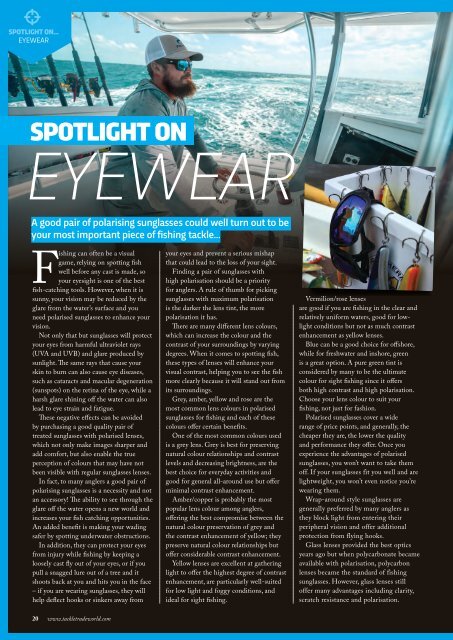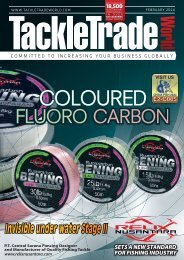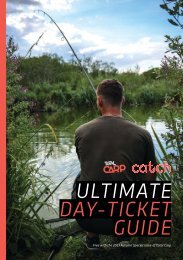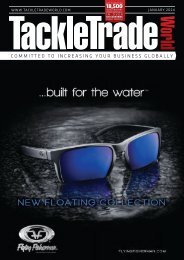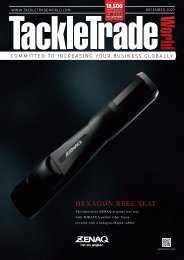You also want an ePaper? Increase the reach of your titles
YUMPU automatically turns print PDFs into web optimized ePapers that Google loves.
SPOTLIGHT ON...<br />
EYEWEAR<br />
SPOTLIGHT ON<br />
EYEWEAR<br />
A good pair of polarising sunglasses could well turn out to be<br />
your most important piece of fishing tackle…<br />
Fishing can often be a visual<br />
game, relying on spotting fish<br />
well before any cast is made, so<br />
your eyesight is one of the best<br />
fish-catching tools. However, when it is<br />
sunny, your vision may be reduced by the<br />
glare from the water’s surface and you<br />
need polarised sunglasses to enhance your<br />
vision.<br />
Not only that but sunglasses will protect<br />
your eyes from harmful ultraviolet rays<br />
(UVA and UVB) and glare produced by<br />
sunlight. The same rays that cause your<br />
skin to burn can also cause eye diseases,<br />
such as cataracts and macular degeneration<br />
(sunspots) on the retina of the eye, while a<br />
harsh glare shining off the water can also<br />
lead to eye strain and fatigue.<br />
These negative effects can be avoided<br />
by purchasing a good quality pair of<br />
treated sunglasses with polarised lenses,<br />
which not only make images sharper and<br />
add comfort, but also enable the true<br />
perception of colours that may have not<br />
been visible with regular sunglasses lenses.<br />
In fact, to many anglers a good pair of<br />
polarising sunglasses is a necessity and not<br />
an accessory! The ability to see through the<br />
glare off the water opens a new world and<br />
increases your fish catching opportunities.<br />
An added benefit is making your wading<br />
safer by spotting underwater obstructions.<br />
In addition, they can protect your eyes<br />
from injury while fishing by keeping a<br />
loosely cast fly out of your eyes, or if you<br />
pull a snagged lure out of a tree and it<br />
shoots back at you and hits you in the face<br />
– if you are wearing sunglasses, they will<br />
help deflect hooks or sinkers away from<br />
your eyes and prevent a serious mishap<br />
that could lead to the loss of your sight.<br />
Finding a pair of sunglasses with<br />
high polarisation should be a priority<br />
for anglers. A rule of thumb for picking<br />
sunglasses with maximum polarisation<br />
is the darker the lens tint, the more<br />
polarisation it has.<br />
There are many different lens colours,<br />
which can increase the colour and the<br />
contrast of your surroundings by varying<br />
degrees. When it comes to spotting fish,<br />
these types of lenses will enhance your<br />
visual contrast, helping you to see the fish<br />
more clearly because it will stand out from<br />
its surroundings.<br />
Grey, amber, yellow and rose are the<br />
most common lens colours in polarised<br />
sunglasses for fishing and each of these<br />
colours offer certain benefits.<br />
One of the most common colours used<br />
is a grey lens. Grey is best for preserving<br />
natural colour relationships and contrast<br />
levels and decreasing brightness, are the<br />
best choice for everyday activities and<br />
good for general all-around use but offer<br />
minimal contrast enhancement.<br />
Amber/copper is probably the most<br />
popular lens colour among anglers,<br />
offering the best compromise between the<br />
natural colour preservation of grey and<br />
the contrast enhancement of yellow; they<br />
preserve natural colour relationships but<br />
offer considerable contrast enhancement.<br />
Yellow lenses are excellent at gathering<br />
light to offer the highest degree of contrast<br />
enhancement, are particularly well-suited<br />
for low light and foggy conditions, and<br />
ideal for sight fishing.<br />
Vermilion/rose lenses<br />
are good if you are fishing in the clear and<br />
relatively uniform waters, good for lowlight<br />
conditions but not as much contrast<br />
enhancement as yellow lenses.<br />
Blue can be a good choice for offshore,<br />
while for freshwater and inshore, green<br />
is a great option. A pure green tint is<br />
considered by many to be the ultimate<br />
colour for sight fishing since it offers<br />
both high contrast and high polarisation.<br />
Choose your lens colour to suit your<br />
fishing, not just for fashion.<br />
Polarised sunglasses cover a wide<br />
range of price points, and generally, the<br />
cheaper they are, the lower the quality<br />
and performance they offer. Once you<br />
experience the advantages of polarised<br />
sunglasses, you won’t want to take them<br />
off. If your sunglasses fit you well and are<br />
lightweight, you won’t even notice you’re<br />
wearing them.<br />
Wrap-around style sunglasses are<br />
generally preferred by many anglers as<br />
they block light from entering their<br />
peripheral vision and offer additional<br />
protection from flying hooks.<br />
Glass lenses provided the best optics<br />
years ago but when polycarbonate became<br />
available with polarisation, polycarbon<br />
lenses became the standard of fishing<br />
sunglasses. However, glass lenses still<br />
offer many advantages including clarity,<br />
scratch resistance and polarisation.<br />
20 www.tackletradeworld.com


